21世纪大学英语英语课文讲解unit1( B )
21世纪大学英语BookI(unit1)secretsofAstudents讲稿(5篇范例)
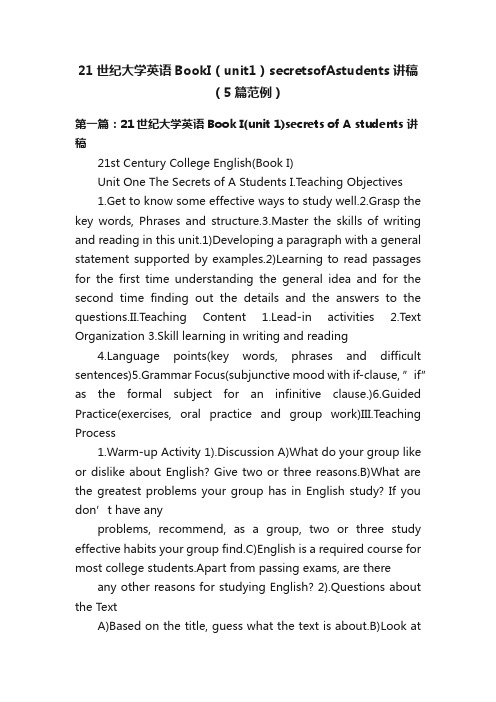
21世纪大学英语BookI(unit1)secretsofAstudents讲稿(5篇范例)第一篇:21世纪大学英语Book I(unit 1)secrets of A students 讲稿21st Century College English(Book I)Unit One The Secrets of A Students I.Teaching Objectives1.Get to know some effective ways to study well.2.Grasp the key words, Phrases and structure.3.Master the skills of writing and reading in this unit.1)Developing a paragraph with a general statement supported by examples.2)Learning to read passages for the first time understanding the general idea and for the second time finding out the details and the answers to the questions.II.Teaching Content 1.Lead-in activities 2.Text Organization 3.Skill learning in writing and readingnguage points(key words, phrases and difficult sentences)5.Grammar Focus(subjunctive mood with if-clause, ”if” as the formal subject for an infinitive clause.)6.Guided Practice(exercises, oral practice and group work)III.Teaching Process1.Warm-up Activity 1).Discussion A)What do your group like or dislike about English? Give two or three reasons.B)What are the greatest problems your group has in English study? If you don’t have anyproblems, recommend, as a group, two or three study effective habits your group find.C)English is a required course for most college students.Apart from passing exams, are there any other reasons for studying English? 2).Questions about the TextA)Based on the title, guess what the text is about.B)Look atthe subheadings, 1-8, in the text.Which of these activities have you already done? In which areas do you feel you need improvement?C)Are there any “secrets” to your own success as a student? In other words, do you have any special study techniques which have been very successful for you? 3)Background InformationA)grading systemGrading is just a means for teachers to measure and assess students study.There ususlly are two grading system: the five-grade-marking system and percentage scales.(五分制和百分制)Schools, colleges and universities in Great Britian and the United States commonly use lettergrades to indicate the quality of a student’s academic performance: A(excellent), B(good), C(average), D(below average), and F(failing).In the United States, work rated C or above is ususlly required of an undergraduate student to continue his / her studies;work rated B or higher is usully required of a graduate student to continue.In percentage scales, 100 percent is the highest mark, and 70 percent(or 65 percent)is usually the lowest passing mark.B).students at universityA university student who has not yet taken his or her first, or “bachelor’s” degree is an undergraduate.In the United States, a first-year student at a college or university, and in a high school as well, is called a freshman, a second-year student a sophomore, and a third-year student a junior, and a fourth-year student a senior.A graduate is a person who has completed a university degree course while a posrgraduate(or graduate in the United States)is a person doing studies that are done at a university after one has received a first degree.C)speed-reading Also known as rapid reading, speed-reading is a method of reading rapidly byskimming and scanning.The aim is to increase the number of words read in a certain length of time, as well as th e reader’s comprehension of the text.2.Text OrganizationPart I(para.1-para.3)presenting the importance of the study skills by two specific examples.Part II(para.4-para.12)giving the 8 study skills concretely 3.Skill learning in writing and reading1)Reading skill: read the assigned passage twice.The first time concentrate on understandingthe general ideas and on the second reading concentrate on the details and any questions in your mind after the first reading.please take Text B and Text C as your reading materials and finally you will become an efficient reader.2)Writing skill: The type of writing is an exposition.This text is a typical “how-to-do-things essay”.This kind of article is ususlly divided intotwo parts: Part 1, the importance of doing this;Part 2, the concrete methods or procedures of doing it.And the second part is the main body of the article.Generally speaking, there’s a topic sentence at the beginning of the text to express the thesis and a conclusive sentence in the end.In this text, after the examples at the beginning, the author tells us the topic sentence “The students at the top of the class get there by mastering a few basic techniques that others can easily learn.”.To match the topic sentence, the author gives us the conclusion sentence “After all, the secrets of A students are not so secret.You can learn and master them and become an A student, too.”nguage Points 1)perform Para.2 vt/vi.A))do;accomplish;carry out.B))act, play, sing or do(tricks)before audience.eg.When will the play be ~ed?The surgeon was ~ing a dangerous operation.performancen.carrying, acting out, playing musiceg.He is excellent in the ~ of his duties.His ~ of Hamlet was very good.performer n.the person who act, play, practice and carry out [C] perform one’s jobperform an experimentperform calculationperform an operationa good/bad performanceperform a trickperform one’s promisegive two performances a day 2)high-achieving para.3 adj.high-scoring/getting high marks[C] high-achieving students[O] underachieving adj.lower-scoring adj.3)concentratepara.4 vt/vidirect(attention ,efforts, etc)to a point of focuseg.He ~d his energies on studying.The soldiers ~d outside the town for the attack.concentrated adj.asembled, intense, be absorbed inconcentration n.getting involved in;people and soldiers absembling;eg.He lacks ~.[C] concentrate one’s attention on/upon/towards sth.concentrate one’s efforts on/upon/ towards sth.concentrate one’s thoughts on/upon/towards sth.concentrate the troopsconcentrated juiceconcentration camp[S] focusv.A))~(on),(cause to)come together at a focus;adjust(an instrument, etc.)so that it is in focus B))~ on, concentrate focuson sth.focus one’s anger on sth.focus one’s attention/thoughts on a problem focus the lens of a microscope4)interruptionn.break;disruptioneg.Numerous ~s have prevented me from finishing the work.I get too many ~s in my work.interrupt v.A)break the continuity of B)break in upon(a person’s action, speech, etc.) eg.The war ~ed the flow of commerce between the two countries.Traffic was ~ed by floods.Those trees are growing so high that they ~ the view.interrupter n.[C] an annoying interruptionwithout interruption service interruptiontemporary interruptioninterruption of telephone communication 5)ignorevt.Take no notice of;refuse to pay attention to para.5eg.He ~d my advice.The driver ~d the traffic light.ignorance n.eg.His failure resulted from his ~.Do you mean you were in complete ~ of the fact?ignoranta.ill-informed, lacking in knowledge, sillyignorantly adv.eg.I’m ~ about politics.I was ~(of the fact)that the boss could be so strict.[C] ignore something ignore somebodyignore personal dangerbe ignorant of / be in ignorance of something[P] Ignorance is bliss.无知便是福。
21世纪大学英语第一册Unit1_Bppt课件

Unit 1: Part B
.
Unit 1: Part A
• Revision of Text A • Text B • Listening Practice • Assignment
.
Revision of Text A
Review of Text A • Exercises Check-up
.
Exercises 2. 据史密斯教授说,幸福就是你能充分利用你所有的一切。 according to Prof. Smith make the most of
Happiness, according to Prof. Smith, is the ability to make the most of what you have.
.
Exercises 3. 你最好把这本书放在你15岁的儿子找不到的地方。 keep the book where … your son can’t get his hands on
You’d better keep the book where your 15-year-old son can’t get his hands on.
time so that y《ou读ca写n 教__o_程r_g_aInf》uizlel:y/moEanxky.eoXtuhIre,lmepso.sso1tn3osf. Additionally, it
is essential to _____ your time andirmrealetverainatls. When you read, it's alright to skip over passages which are _____ to your Tstaukdiny.gThe way you behave in clraestsaiisn/adlsigoeismt/apbosrotarnbt. _____ good notes will help you _____ the informwahtieotnhewr hich is presented and asking questions will let you know _____ you have got the point or not. Finalalpy,pirfoyaocuhesstudy with a group, you can learn more from the different _____ and solutions of the other students.
21世纪大学实用英语综合教程(第二册)课文翻译及课后习题答案unit1
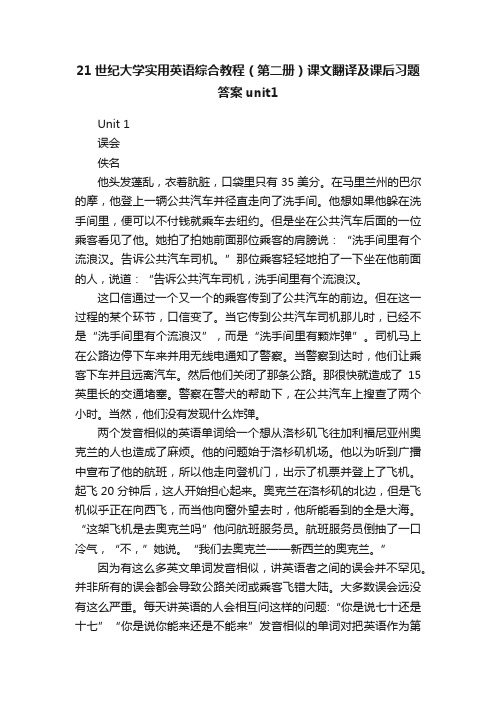
21世纪大学实用英语综合教程(第二册)课文翻译及课后习题答案unit1Unit 1误会佚名他头发蓬乱,衣着肮脏,口袋里只有35美分。
在马里兰州的巴尔的摩,他登上一辆公共汽车并径直走向了洗手间。
他想如果他躲在洗手间里,便可以不付钱就乘车去纽约。
但是坐在公共汽车后面的一位乘客看见了他。
她拍了拍她前面那位乘客的肩膀说:“洗手间里有个流浪汉。
告诉公共汽车司机。
”那位乘客轻轻地拍了一下坐在他前面的人,说道:“告诉公共汽车司机,洗手间里有个流浪汉。
这口信通过一个又一个的乘客传到了公共汽车的前边。
但在这一过程的某个环节,口信变了。
当它传到公共汽车司机那儿时,已经不是“洗手间里有个流浪汉”,而是“洗手间里有颗炸弹”。
司机马上在公路边停下车来并用无线电通知了警察。
当警察到达时,他们让乘客下车并且远离汽车。
然后他们关闭了那条公路。
那很快就造成了15英里长的交通堵塞。
警察在警犬的帮助下,在公共汽车上搜查了两个小时。
当然,他们没有发现什么炸弹。
两个发音相似的英语单词给一个想从洛杉矶飞往加利福尼亚州奥克兰的人也造成了麻烦。
他的问题始于洛杉矶机场。
他以为听到广播中宣布了他的航班,所以他走向登机门,出示了机票并登上了飞机。
起飞20分钟后,这人开始担心起来。
奥克兰在洛杉矶的北边,但是飞机似乎正在向西飞,而当他向窗外望去时,他所能看到的全是大海。
“这架飞机是去奥克兰吗”他问航班服务员。
航班服务员倒抽了一口冷气,“不,”她说。
“我们去奥克兰——新西兰的奥克兰。
”因为有这么多英文单词发音相似,讲英语者之间的误会并不罕见。
并非所有的误会都会导致公路关闭或乘客飞错大陆。
大多数误会远没有这么严重。
每天讲英语的人会相互问这样的问题:“你是说七十还是十七”“你是说你能来还是不能来”发音相似的单词对把英语作为第二语言的人来说,特别容易让人混淆。
一天早晨,一位生活在美国的韩国妇女到上班地点时,她的老板问她:“你拿到盘子了吗” “没有……”她回答说,心里却在纳闷,不知道他到底是什么意思。
21世纪大学新英语读写译教程 第三册 课文翻译 课件 ppt Unit 1
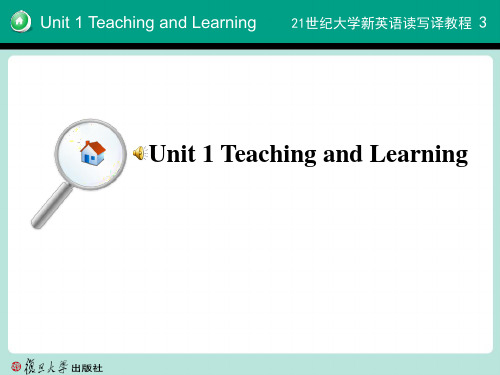
Unit 1 Teaching and Learning
Lead-in
B. Listening Practice Post-listening task Answer the following questions.
21世纪大学新英语读写译教程 3
1. Why should a good teacher develop a variety of teaching styles? Because students have different learning styles, and _______________________________________________ different subjects require different teaching styles. ______________________________________________ 2. Why do teachers need to help students to link what they are learning to daily living experiences? Because they will keep students engaged and motivated in ____________________________________________________ the learning process. ____________________
Unit 1 Teaching and Learning
21世纪大学新英语读写译教程 3
Outline
Teaching Objectives Part 1 Part 2 Part 3 Part 4 Lead-in Reading Focus—Text A Integrated Exercises Reading Focus—Text B
21世纪大学英语读写教程第二册unit1-B篇课件
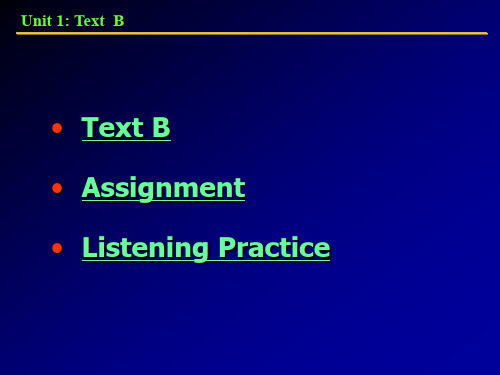
Text B: Reading Skill
4. Building shelters for the dying was Mother Teresa’s signature service. A) the service she was most famous for B) her most profitable service C) her most controversial service
minister to
uncared for
A) take advantage of A) people whom no one
takes care of
B) govern
B) people who care for no one
C) take care of
C) people who have no children
Text B: Language Points
a pain in her back. “I cannot breathe,” she told a doctor summoned to her side. Moments later, she died. Shortly after, her nuns tolled a huge metal bell and some 4,000 people gathered in the rain outside — among them many of the street people she had served for so long. Inside, Mother Teresa's body was washed, dressed and laid on a bed of ice. One by one the nuns filed past, touching her bare feet in a traditional Indian gesture of respect.
关于21世纪大学英语课文翻译unit1

Unit 1 Book 3Do you remember your first love? All those exciting and wonderful new emotions – the way your heart raced when that special person was near –those anxious, awkward moments when you didn't know what to say or do? And then (for most of us) that sad moment when for one reason or another it all came to an end … Ernest Hemingway once said, "Every love story ends as a tragedy" – but the authors of the texts in this unit have a different point of view. Text A focuses on the unexpected side effects of the author's first venture into romance, while Text B recalls the ups and downs of the author's great love for … his car! Finally, the authors of Text C offer some fascinating advice about how to successfully navigate romantic relationships.Text A How I Got SmartA common misconception amongyoungsters attending school is that theirteachers were child prodigies. Who else but abookworm, with none of the normal kid'stendency to play rather than study, wouldgrow up to be a teacher anyway?I've tried desperately to explain to my students that the image they have of me as an enthusiastic devotee of books and homework during my adolescence was a bit out of focus. On the contrary, I hated compulsory education with a passion. I could never quite accept the notion of having to go to school while the fish were biting.But in my sophomore year, something beautiful and exciting happened. Cupid aimed his arrow and struck me right in the heart. All at once, I enjoyed going to school, if only to gaze at the lovely face in English II.My princess sat near the pencil sharpener, and that year I ground up enough pencils to fuel a campfire. Alas, Debbie was far beyond my wildest dreams. We were separated not only by five rows of desks, but by about 50 I.Q. points. She was the top student in English II, the apple of Mrs. Larrivee's eye.Occasionally, Debbie would catch me staring at her, and she would flash a smile that radiated intelligence and quickened my heartbeat. It was a smile that signaled hope and made me temporarily forget the intellectual gulf that separated us.I schemed desperately to bridge that gulf. Andone day, as I was passing the supermarket, an ideacame to me. A sign in the window announced thatthe store was offering the first volume of a set ofencyclopedias at the special price of 29 cents. Theremaining volumes would cost $2.49 each.I purchased Volume I -- Aardvark to Asteroid -- and began my venture into the world of knowledge. I would henceforth become a seeker of facts. I would become Chief Brain in English II and sweepmy princess off her feet with a surge of erudition.I had it all planned.My first opportunity came one day in thecafeteria line. I looked behind me and there shewas.“Hi,” she sai d.After a pause, I wet my lips and said, “Know where anchovies come from?”She seemed surprised. “No, I don't.”I breathed a sigh of relief. “The anchovy lives in salt water and is rarely found in fresh water.” I had to talk fast, so that I co uld get all the facts in before we reached the cash register. “Fishermen catch anchovies in the Mediterranean Sea and along the Atlantic coast near Spain and Portugal.”“How fascinating,” said Debbie, shaking her head in disbelief. It wasobvious that I had made quite an impression.A few days later, during a fire drill, I casuallywent up to her and asked, “Ever been to theAleutian Islands?”“Never have,” she replied.“Might be a nice place to visit, but I certainly wouldn't want to live there,” I said.“Why not?” said Debbie, playing right into my hands.“Well, the climate is forbidding. There are no trees on any of the 100 or more islands in the group. The ground is rocky and very little plant life can grow on it.”“I don't think I'd even care to visit,” she said.The fire drill was over and we began to file into the building, so I had to step it up to get the natives in. “The Aleuts are short and sturdy and have dark skin and black hair. They live on fish, and they trap blue foxes and seals for their valuable fur.”Debbie's eyes widened in amazement.One day I was browsing through the library. Ispotted Debbie sitting at a table, absorbed in acrossword puzzle. She was frowning, apparentlystumped on a word. I leaned over and asked if I couldhelp.“Four-letter word for Oriental female servant,” Debbie said.“Try amah,” I said, quick as a flash.Debbie filled in the blanks, then turned to stare at me in amazement. “I don't believe it,” she said. “I just don't believe it.”And so it went, that glorious, joyous, romantic sophomore year. Debbie seemed to relish our little conversations and hung on my every word.Naturally, the more I read, the more my confidencegrew.In the classroom, too, I was gradually making mypresence felt. One day, during a discussion ofColeridge's “The Ancient Mariner”, we came across theword albatross.“Can anyone tell us what an albatross is?” asked Mrs. Larrivee.My hand shot up. “The albatross is a large bi rd that lives mostly in the ocean regions below the equator, but may be found in the north Pacific as well. The albatross measures as long as four feet and has the greatest wingspread of any bird. It feeds on fish and shellfish. The albatross has an enormo us appetite, and when it's full it has trouble getting into the air again.”There was a long silence in the room. Mrs. Larrivee couldn't quite believe what she had just heard. I sneaked a look at Debbie and gave her a big wink.She beamed proudly and winked back.What I failed to perceive was that Debbie all thiswhile was going steady with a junior from aneighboring school -- a basketball player with a C+average. The revelation hit me hard, and for a while Ifelt like forgetting everything I had learned. I had savedenough money to buy Volume II --Asthma to Bullfinch-- but was strongly tempted to invest in a basketball instead.I felt not only hurt, but betrayed. Like Agamemnon, but with less drasticconsequences, thank God.In time I recovered from my wounds. The next yearDebbie moved from the neighborhood and transferred toanother school. Soon she became no more than a memory.Although the original incentive was gone, I continuedporing over the encyclopedias, as well as an increasing number of other books. Having tasted of the wine of knowledge, I could not now alter my course. For:“A little knowledge is a dangerous thing:Drink deep, or taste not the Pierian spring.”So wrote Alexander Pope, Volume XIV -- Paprika to Pterodactyl.斯蒂夫· 普罗迪上学的孩子们中间有一种普遍的错误想法,即认为他们的老师当年都是些神童。
21世纪大学英语综合教程4Unit1-B
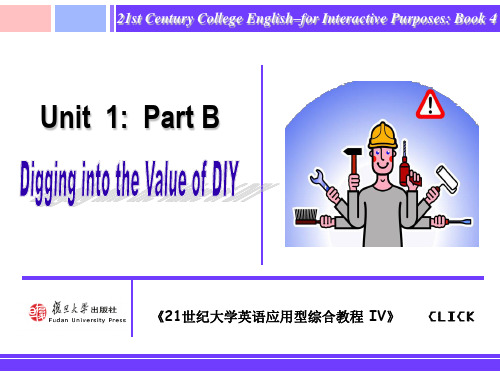
Unit 1: Warm up
Directions: You will hear a passage and you are required to fill in the blanks with the exact words you have just heard.
M: The bathroom looks lovely. Did you redecorate it yourself or did you 1. _____________ to do it for you?
M: So, let’s see. You have put new tiles on the floor and 3. _______ a few tiles on the walls. You’ve also 4. _____ a small cupboard for toiletries. The bath, shower and washbasin are the same as before,
information I got from the Internet. Doing the flooy — from early morning right through to the evening. Then I spent a few hours replacing the 6. ______ wall tiles. Putting the cupboard up took about an hour, so it took me two days 7. ________. M: I think you’ve done a very good job. At least as good as a 8.
21世纪大学实用英语综合教程(第二册)课文翻译及课后习题答案unit1
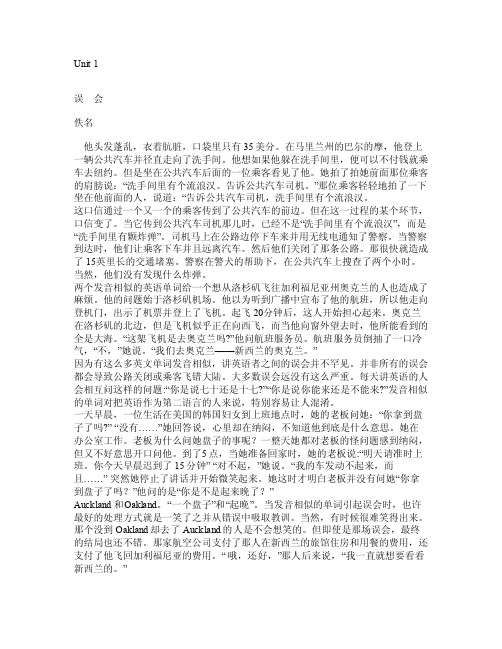
Unit 1误会佚名他头发蓬乱,衣着肮脏,口袋里只有35美分。
在马里兰州的巴尔的摩,他登上一辆公共汽车并径直走向了洗手间。
他想如果他躲在洗手间里,便可以不付钱就乘车去纽约。
但是坐在公共汽车后面的一位乘客看见了他。
她拍了拍她前面那位乘客的肩膀说:“洗手间里有个流浪汉。
告诉公共汽车司机。
”那位乘客轻轻地拍了一下坐在他前面的人,说道:“告诉公共汽车司机,洗手间里有个流浪汉。
这口信通过一个又一个的乘客传到了公共汽车的前边。
但在这一过程的某个环节,口信变了。
当它传到公共汽车司机那儿时,已经不是“洗手间里有个流浪汉”,而是“洗手间里有颗炸弹”。
司机马上在公路边停下车来并用无线电通知了警察。
当警察到达时,他们让乘客下车并且远离汽车。
然后他们关闭了那条公路。
那很快就造成了15英里长的交通堵塞。
警察在警犬的帮助下,在公共汽车上搜查了两个小时。
当然,他们没有发现什么炸弹。
两个发音相似的英语单词给一个想从洛杉矶飞往加利福尼亚州奥克兰的人也造成了麻烦。
他的问题始于洛杉矶机场。
他以为听到广播中宣布了他的航班,所以他走向登机门,出示了机票并登上了飞机。
起飞20分钟后,这人开始担心起来。
奥克兰在洛杉矶的北边,但是飞机似乎正在向西飞,而当他向窗外望去时,他所能看到的全是大海。
“这架飞机是去奥克兰吗?”他问航班服务员。
航班服务员倒抽了一口冷气,“不,”她说。
“我们去奥克兰——新西兰的奥克兰。
”因为有这么多英文单词发音相似,讲英语者之间的误会并不罕见。
并非所有的误会都会导致公路关闭或乘客飞错大陆。
大多数误会远没有这么严重。
每天讲英语的人会相互问这样的问题:“你是说七十还是十七?”“你是说你能来还是不能来?”发音相似的单词对把英语作为第二语言的人来说,特别容易让人混淆。
- 1、下载文档前请自行甄别文档内容的完整性,平台不提供额外的编辑、内容补充、找答案等附加服务。
- 2、"仅部分预览"的文档,不可在线预览部分如存在完整性等问题,可反馈申请退款(可完整预览的文档不适用该条件!)。
- 3、如文档侵犯您的权益,请联系客服反馈,我们会尽快为您处理(人工客服工作时间:9:00-18:30)。
Text B Little Sister of the Poor1.Mother Teresa (1910~1997)Mother Teresa, a Roman Catholic nun, was born to Albanian parents in Yugoslavia. She is known as “the Saint of the Gutters” for bringing comfort and dignity to the destitute贫穷的. She founded an order (Missionaries of Charity) which is noted for its work among the poor and the dying in Calcutta, India, and throughout the world. Mother Teresa was awarded the Nobel Peace Prize in 1979.2. Roman Catholic ChurchThe Roman Catholic Church, also called the Catholic Church or the Church of Rome, is the Christian Church with administrative headquarters in the Vatican, of which the pope, or the Bishop of Rome is the supreme head.3.John Paul II (1920~)John Paul II is the first non-Italian Polish Pope in the history of the Roman Catholic church. He was elected pope on Oct. 16, 1978. John Paul II is a conservative pope who firmly holds traditional Catholic views.4. ChernobylThe world’s worst nuclear-reactor accident occurred at the Chernobyl (Ukraine) nuclear power plant on Apr. 26, 1986. The accident caused the immediate death of 31 people, while many others suffered radioactive contamination污染.6. the Nobel PrizeAny of the prizes (five in number until 1969, when a sixth was added) that are awarded annually by four institutions (three Swedish and one Norwegian) from a fund established under the will of Alfred Bernhard Nobel. Distribution was begun on Dec. 10, 1901, the fifth anniversary of the death of the founder, whose will specified that the awards should annually be made “to those who, during the preceding year, shall have conferred the greatest benefit on mankind.” The five prizes established by his will are: the Nobel Prize for Physics; the Nobel Prize for Chemistry; the Nobel Prize for Physiology or Medicine; the Nobel Prize for Literature; and the Nobel Prize for Peace. An additional award, the Prize for Economic Sciences in Memory of Alfred Nobel, was set up in 1968 by the Bank of Sweden, and the first award was given in 1969.Text Analysis:Part I (Para 1-3) death of the Mother Teresa and the public response1.(para.1) Mother Teresa served the dying and desperate all over the world.2.(para.2) Mother Teresa died of illness and many people felt personal grief over her death.3.(para.3) Mother Teresa was regarded as a living saint and what she did transcended the boundaries of religion and nationality.Part II(para.4~8) The development of Mother Teresa’s cause and countless acts of mercy Part III(para.9~11) Mother Teresa gained fame and honor as well as criticism. Her act will be remembered by people.Words & Expressions:1. Hospitalize vt. (usu. pass.) put (a person) into hospital [常被动] 送…进医院治疗He hospitalizes patients for minor ailments. 他把只有小病的患者也送进医院。
Mrs Smith seriously ill already hospitalize. 史密斯夫人病重已住院。
You must hospitalize right now. 你必须立即住院。
plain v 1.~of/about sth: tell others that sth is making you feel ill不满,埋怨He complained of headache.She’s been complaining of a bad back recently.The patient is complaining of acute earache.2.~to sb: tell formally that sth is wrong 抱怨, 诉苦, 埋怨,You can complain to the manger if the service is poor here.She’d complained to the police if we made any more noise.My sister is always complaining to me of her heavy schoolwork.complaint n不满,投诉, 控告3. Summon vt. ~ sb to sth; ~ sb together request or order sb to come 召唤,传唤The police summoned the witness. 警察传证人。
They summoned (up) their courage to meet the deadline.他们努力要在终止日期前完工。
He was summoned to appear in court as a witness. 他被传唤出庭作证。
He came downstairs and summoned her to his study. 他下楼将她叫到书房去。
They had to summon a second conference and change the previous decision.他们不得不召集第二次会议,改变以前的决定。
Summon the pupils together in the school hall.The shareholders were summoned by my boss to a general meeting.I was summoned by my boss (to explain my actionsSummon the pupils together in the school hall.4. street people:people living in slums who, esp. during the summer, spend much of their time sitting on building steps, standing on the sidewalk talking, or visiting neighbors and local stores; the local people of a crowded neighborhood. 街头流浪者4. gesture n 1.expressive movement of a part of the body, esp the hand or head姿势,手势make a rude gesture with a gesture of despair communicating by gesture2. ~ sth (to sb) convey sth by making gestures 姿态,表示(尤指友好的表示)。
She gestured her disapproval.He gestured (to me) that it was time to go.He gestured to them to keep quiet5. Abandon vt. desert; leave completely and for ever 抛弃;放弃abandon a friend in trouble.抛弃处于危难中的朋友abandon one’s idea放弃自己的想法He abandoned his wife and child.他遗弃了他的妻子和孩子。
